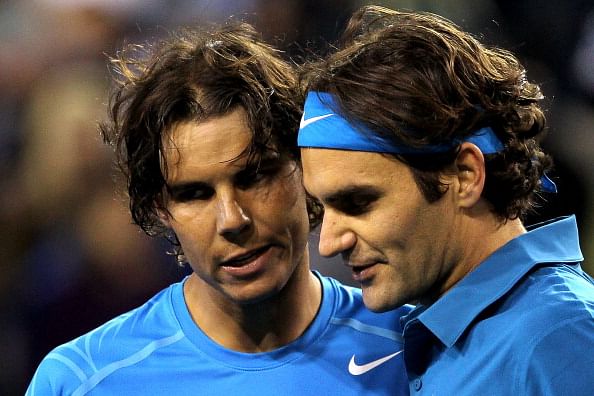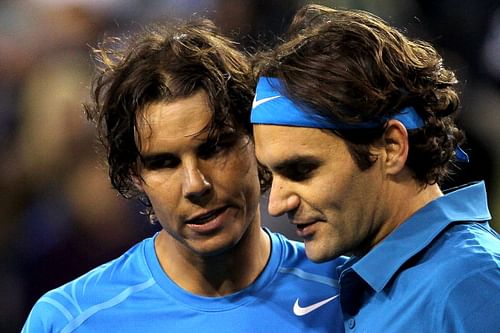
Roger versus Rafa will be sorely missed in the future

INDIAN WELLS, CA – MARCH 17: Rafael Nadal of Spain congratulates Roger Federer of Switzerland after their match during the semifinals of the BNP Paribas Open at the Indian Wells Tennis Garden on March 17, 2012 in Indian Wells, California.
Sport is undoubtedly life’s modern theatre: an arena where we gather in the name of entertainment to cheer our own heroes in an unknown script. We passionately take our seats to establish our individual successes in supporting a hero, oblivious to his opponent or the enormity of the occasion. Optimism can shatter logic and patriotism reasoning.
But in that desperate hour, one penalty kick, one header in extra time, one innings of unwavering bravado, one basket in the last second, one maiden in the 49th over, one flashed cross-court winner on the opponent’s match point, can dramatically alter the script of the pulse in a matter of seconds, heralding the birth of a new hero, for this valiant warrior gives life to a far-fetched dream.
Indeed, sport, pretty much like spirituality, finds its followers their God in that darkest hour.
And therefore, since the advent of sports, the artists upon the grand stage of play have ignited the hearts of millions of followers. Best summed up in the words of Santiago Munez’s coach in the movie Goal! when he says, ‘these men shall remain heroes of any time, despite the fact that one was a daily wage worker in the mill by profession; on the field he was only our hero!’
Critically speaking, it isn’t the genius of the sportsman per se that makes him a ‘hero’ but rather rightfully, the timing of his performance.
But ‘divinity’ in sport is altogether different.
It demands respect by the sheer refinement of its art. Few stand in that league, and they are the stuff of legends. When they walk out on to the sporting field, we are awakened to the enormity of the occasion, as their elegance stirs us from our petty submission to our frugal human emotion. We are no more witness to a duel of superiority. It’s all just the master and His show.
How could the world miss this artist?
Accolades pour in, adjectives are dished out, articles of praise heaped, and he gets an inclusion in the conversation in the park, hall, garden, street. A fan club takes form that soon leads to another thousand. Pretty soon, all but the opponent are (openly) cheering him.

‘Isn’t he God after all?’ we are forced to wonder!
Until, all of a sudden there comes a thorn in the flesh. Someone who makes our divinity look mortal, shaking our idea of supremacy. For all the sheer romance of this angel’s flight, the demonic burst of unreserved opposition seems cruel. And there begins in the chapter of sport the greatest rivalry. Pretty soon, all those who’ve admired the god merely for his lack of opposition, shift sides to this new warrior, who gives them a hope that they could even win after betting on an underdog. The large faithful though, remain, for they’ve been baptized beyond the pain of occasional defeat to the divine. They know that adversaries are but a passing cloud.
There can be nothing more appetizing than such a confrontation.
Tennis over the eras has enjoyed its fair share of popularity owing to many such intense rivalries. Be it Becker with Edberg, the temperamental artist McEnroe against the ice-cool Borg, a methodical Sampras against a flamboyant Agassi, and in the women’s game, Seles against Graf.
And the most recent of two pure, inexhaustible machines: Rafae Nadal and Novak Djokovic.
But for my generation, God probably reserved the best. Roger Federer versus Rafael Nadal!
Some of the game’s finest moments have been conjured during the combination of these two. It’s an entertainment that promises the entirety of emotions, given that we have the sublime poise of artistic elegance taking on sheer unwavering mechanical athleticism.

Their game has two agents of death, albeit in contrasting expression. Federer soulfully puts you down with his mesmerizing mermaid’s song of death while Nadal is like the ferocious adrenalin-pumping Spanish bull that wears you down. All in all, when they meet, you have the combination of the bold and the beautiful, of style and substance.
In this hour of celebration, when the master has regained his glorious form, shedding his pale flame that seemed to flicker in the critics’ eyes, the absence of his greatest rival seems like an anguishing void. For in his absence, we are denied yet another grand spectacle of the sport’s two greatest gladiators at war. It’s been a while since we have had a reason to celebrate seeing them face off.
One enchants while the other excites. One dictates, the other dedicates. One is making history, the other redefining it. One is the God of the sport, the other his sporting reflection. If you adore one, you will admire the other. One’s game is about an aesthetic appeal eliciting stupefying exclamations while the other’s an athletic perseverance evoking marathon gasps.
One has dethroned a glorious past, demolishing competition, establishing himself as the supreme monarch. The other stands in all humility, knocking jabs into the emperor’s armor, ascertaining his worthy succession. Despite the victor, one needs the other, deserves the other. With both of them, it ain’t all over until it is over.
Both are essential to the wholesome portrait called tennis.
Roger, in his current blistering avatar, will probably lift this year’s US Open crown, but in the heart of hearts, we shall moan that he did it without humbling his greatest foe.
As always, glory seems so kind to the deserving.